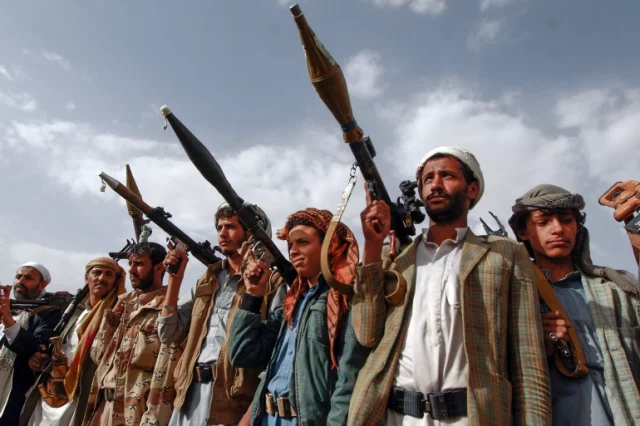
The Houthi rebels of Yemen are a terrorist group. If it wasn’t clear enough from the missile attacks targeting civilians in Saudi Arabia and the United Arab Emirates (UAE), there is official international confirmation.
Human Rights Watch (HRW) saw it. “Houthi forces have used banned antipersonnel landmines, recruited children, and fired artillery indiscriminately into cities such as Taizz, killing and wounding civilians, and launched indiscriminate ballistic missiles into Saudi Arabia.”
President Joe Biden, in early 2021, said, “[Our policy] has nothing to do with our view of the Houthis and their reprehensible conduct, including attacks against civilians and the kidnapping of American citizens. We are committed to helping Saudi Arabia defend its territory against further such attacks.”
Unfortunately, President Biden’s astute description came as he removed the Houthis from the designated terror organization list, the result of which is being played out now in Saudi Arabia and the UAE — American friends and allies.
This is a point to emphasize: the UAE took an enormous step in choosing to establish diplomatic, economic, and security relations with Israel through the Abraham Accords. The UAE, the other Abraham Accords countries, and countries considering making the leap should be at the forefront of American attention and assistance.![]()
Instead, the administration gave Houthi terrorists a pass, and the world has seen an increase in attacks on cities and production facilities in the UAE and Saudi Arabia, and now a deliberate Houthi missile attack on the American Al-Dhafra Air Base in Abu Dhabi, home to 2,000 servicemembers. Central Command reported that American and UAE armed forces “combined successfully” and “prevented both missiles from impacting the base.” But it was the second time in a week that American airmen were forced into bunkers.
Houthi rebels are attacking American air bases with missiles with no American response? This cannot be separated from America’s ignominious and bloody departure from Afghanistan last summer, reducing the confidence of our friends and allies in our reliability — and increasing the brazenness of our adversaries.
Wars used to be attached to territory. Hold the territory, win the war; lose the territory, accept terms of surrender. But across the Middle East and parts of Africa today, war is a transnational operation, and territory is fungible. President George W. Bush was not wrong in his designation of a “war against terrorists and the states that harbor and support them.” There is a symbiotic relationship between terrorists and their state sponsors. Each needs assets the other has.
- Terrorists need land to train and land to hide, weapons, and the political support of governments. They also like ungoverned or under-governed space — like Afghanistan after the American departure, or Syria, or Gaza, or Lebanon.
- States need the occasional ability to create mayhem without a return address.
The state sponsor of Houthi terror and crimes is Iran.
If the United States is unwilling a) to name the Islamic Republic and b) hold Tehran accountable, Iran pays no price, and the terror continues. This is from the State Department press briefing following the most recent Houthi attacks on Saudi Arabia and the UAE:
The United States condemns the overnight attack by the Houthis on the United Arab Emirates and Saudi Arabia, which resulted in civilian injuries in Saudi Arabia and follows a similar Houthi incursion last week that killed three civilians in Abu Dhabi. We reaffirm our commitment to help strengthen the defense of our Saudi and Emirati partners.
These attacks on the UAE and Saudi Arabia, as well as recent airstrikes in Yemen that killed civilians, represent a troubling escalation that only exacerbates the suffering of the Yemeni people.
We call on all parties to the conflict to commit to a ceasefire, abide by their obligations under international humanitarian law, including those related to protection of all civilians, and
The Yemeni people urgently need a diplomatic solution to the conflict, a diplomatic solution that improves their lives and allows them to collectively determine their own future.
The State Department official statement noted, “The Houthis have claimed responsibility for this attack.” And White House national security adviser Jake Sullivan said Washington would work to hold the Houthis accountable.
None mentioned Iran. And none will.
The unwillingness of the Biden administration to connect the Houthi dot to the Iranian dot is the result of the president’s determination to restore the Obama administration’s flawed, abused, and expiring JCPOA (the “Iran deal”). American officials are determined to skip over Iran’s ballistic missile program, human rights violations, and support for proxy terror armies and militias, including the Houthis, but also Shiite militias in Syria and Iraq, plus Hamas in Gaza and Hezb’allah in the wreckage of Lebanon. In September, the U.S. withdrew U.S. air defenses from Saudi Arabia. The administration is not enforcing sanctions on China for its Iranian oil purchases. And last week, Washington arranged for South Korea to pay Iran’s U.N. dues out of frozen funds.
There is talk about restoring the Houthis to the terror sponsorship list. OK, fine. But as long as Iran, the actual sponsor of a criminal terror organization, is not brought to account by the United States, the people of the region have no ability to “improve their lives” or “collectively determine their own future.” And those who would stand with us have every reason to fear for their security.

